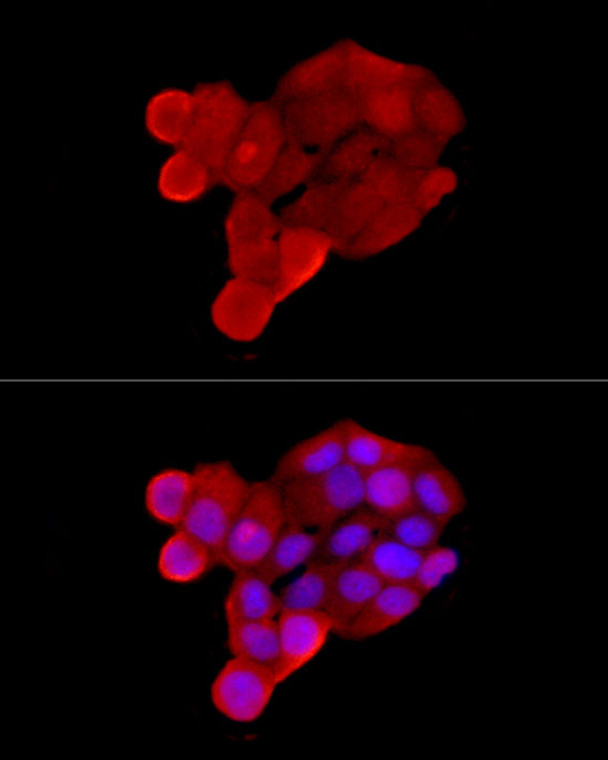| Host: |
Rabbit |
| Applications: |
WB/IF |
| Reactivity: |
Human/Mouse/Rat |
| Note: |
STRICTLY FOR FURTHER SCIENTIFIC RESEARCH USE ONLY (RUO). MUST NOT TO BE USED IN DIAGNOSTIC OR THERAPEUTIC APPLICATIONS. |
| Short Description: |
Rabbit polyclonal antibody anti-SLC22A5 (430-557) is suitable for use in Western Blot and Immunofluorescence research applications. |
| Clonality: |
Polyclonal |
| Conjugation: |
Unconjugated |
| Isotype: |
IgG |
| Formulation: |
PBS with 0.02% Sodium Azide, 50% Glycerol, pH7.3. |
| Purification: |
Affinity purification |
| Dilution Range: |
WB 1:500-1:2000IF/ICC 1:50-1:200 |
| Storage Instruction: |
Store at-20°C for up to 1 year from the date of receipt, and avoid repeat freeze-thaw cycles. |
| Gene Symbol: |
SLC22A5 |
| Gene ID: |
6584 |
| Uniprot ID: |
S22A5_HUMAN |
| Immunogen Region: |
430-557 |
| Immunogen: |
Recombinant fusion protein containing a sequence corresponding to amino acids 430-557 of human SLC22A5 (NP_003051.1). |
| Immunogen Sequence: |
VLVMVGKFGVTAAFSMVYVY TAELYPTVVRNMGVGVSSTA SRLGSILSPYFVYLGAYDRF LPYILMGSLTILTAILTLFL PESFGTPLPDTIDQMLRVKG |
| Tissue Specificity | Strongly expressed in kidney, skeletal muscle, heart and placenta. Primarily expressed by surface epithelial cells of the colon (at protein level). Expressed in CD68 macrophage and CD43 T-cells but not in CD20 B-cells. In testis, localized to Sertoli cell basal membranes, peritubular myoid cells and Leydig cells. |
| Post Translational Modifications | Glycosylated. Glycosylation affects the expression levels. Isoform 3: Not glycosylated. |
| Function | Sodium-ion dependent, high affinity carnitine transporter. Involved in the active cellular uptake of carnitine. Transports one sodium ion with one molecule of carnitine. Also transports organic cations such as tetraethylammonium (TEA) without the involvement of sodium. Relative uptake activity ratio of carnitine to TEA is 11.3. In intestinal epithelia, transports the quorum-sensing pentapeptide CSF (competence and sporulation factor) from Bacillus Subtilis wich induces cytoprotective heat shock proteins contributing to intestinal homeostasis. May also contribute to regulate the transport of organic compounds in testis across the blood-testis-barrier (Probable). Isoform 3: Retained in the ER, unable to perform carnitine uptake. |
| Protein Name | Organic Cation/Carnitine Transporter 2High-Affinity Sodium-Dependent Carnitine CotransporterSolute Carrier Family 22 Member 5 |
| Database Links | Reactome: R-HSA-200425Reactome: R-HSA-549127Reactome: R-HSA-5619053 |
| Cellular Localisation | Cell MembraneMulti-Pass Membrane ProteinApical Cell MembraneBasal Cell MembraneIn Intestinal CellsApical Expression Is Induced By TnfLocalized To The Basal Membrane Of Sertoli CellsIsoform 3: Endoplasmic Reticulum |
| Alternative Antibody Names | Anti-Organic Cation/Carnitine Transporter 2 antibodyAnti-High-Affinity Sodium-Dependent Carnitine Cotransporter antibodyAnti-Solute Carrier Family 22 Member 5 antibodyAnti-SLC22A5 antibodyAnti-OCTN2 antibody |
Information sourced from Uniprot.org
12 months for antibodies. 6 months for ELISA Kits. Please see website T&Cs for further guidance










